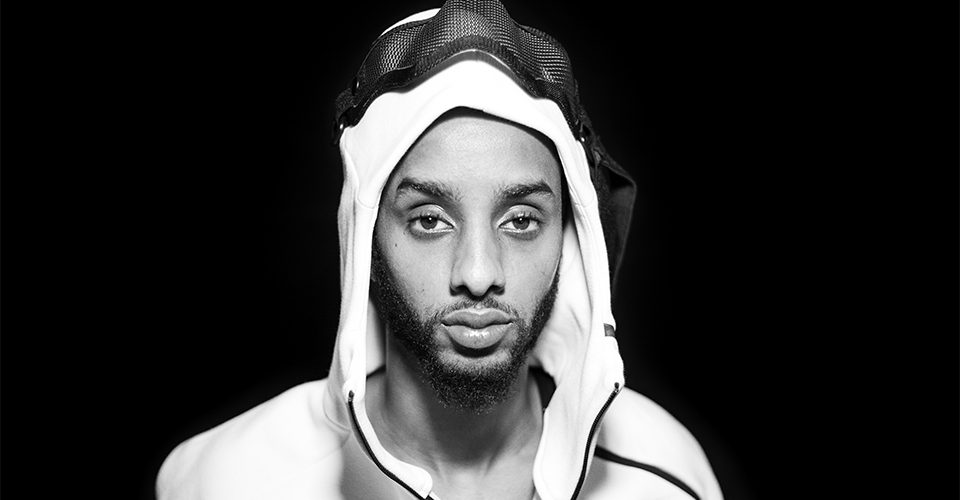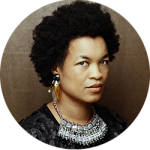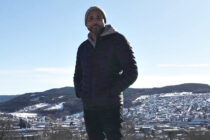I encountered 26-year-old Simon Matiwos’ poem “Tänk Om” one day while surfing on UR (Utbildnings Radio), the Swedish public radio service’s website. Even though I still struggle with the subtleties of the Swedish language, the poem spoke to me, so I decided to seek him out to learn more.
Simon and his twin sister were born in Hudiksvall, in the far north of Sweden to parents who had fled war in Eritrea, but grew up in Husby, a suburb of Stockholm.
How did you become a poet?
It came out of doing hip-hop with guys from my neighbourhood. We used to hang out in the recording studio of the local youth centre. Eventually our crew “Krabban” created a buzz in Stockholm, but the studio was closed as the authorities disapproved of the language we were using in the music.
Then I made a life-changing trip to Australia where I got the opportunity to do an internship working with dysfunctional kids at a school in Sydney. This was my first time traveling alone. I felt very small and very far away from home.
On a trip to Bali, I travelled via Darwin where I met some Aborigines. They were shut out of society at the economic, structural and social levels, but their culture and traditions are strong. I learnt a lot from them and it left a mark on me.
Back home, I started writing about my life and everything that I kept inside: the deaths of people close to me who were role models; new friends; relationships; break-ups; moving away from home. Writing also rekindled my interest in politics.
All of this happened during a tumultuous period. Neo-nazism was on the rise. There were the recent riots in Husby. It was in this period (through my friend Keya from Krabban), that I met Saman and Bipasha, the founders of Förenade Förorter. They’ve remained close friends today. They were looking to set up a poetry slam with a team from the suburbs. I was very nervous about competing but had come to a point in my life where I felt it was “tid och momentum”, the right time and moment.
“Om man vill ha förebilder, om det inte finns, då måste man vara en själv”
/ If you want a role model, and there’s none, be one yourself.
What’s it like to compete in poetry?
A poetry slam is a magical feeling! It’s a more humble stage. People don’t think so much about competing. It’s not so much about the poet as about the vibe. So the kind of pressure to deliver a show, like at hip-hop concerts, is not there. The audience wants to be with you, because poems are more personal, so they’ll wait if you have to cough, or if you have to go off stage, they’ll call you back on.
“När jag ställde mig på scen, det kändes hemma”
/ When I stood on stage, I felt at home.
Poetry is a way for people to speak honestly about a lot of things. Especially in poetry slams, it’s a way to send out a ripple that can have reverberating effects. What is your take on poetry as a political tool?
I think about it like this: If the whole world stopped for a second, and someone gave you a mic, what are you going to say at that moment? You’re not going to talk about your personal problems. You’re going to talk about something that will make everyone understand what’s going on right now.
So when I get the chance to sit in front of two or three hundred people, and I have a mic, and everybody is choosing to listen, I have to say something that people need to hear. Because people neither want to hear it from politicians, nor from the people who are struggling. So, I feel like I’m in the middle. I can speak for “dom”/ them on one side and speak “dom andras”/ the other side’s language as well.
“I speak for dom and I speak against dom”.
Editor’s note: it’s a beautifully said play on the Swedish language that unfortunately gets a little lost in translation. Here’s a great example of how Simon uses language: https://www.youtube.com/watch?v=EQJsH1SSVWM
The same demands for diversity and representation that we have, sometimes come back to us. How do you answer the people that say “well, you don’t want to be niched, do you?”
Yes, one shouldn’t be niched. But I think that first there shouldn’t be an internalized “typical” image of you. “Innerstans poesi” is a certain type of poetry. People in the suburbs talk about what actually happens there, struggles…realness. I have to start there. But when people know who I am, then I can leave space for others and move on to talking about other subjects. You should resist being put in a box, because you have to develop, as a person. I also write poems that are not political. I have a poem called “Vit sand, blå himmel” about nature and what it did for me in my experiences in Australia. Since that trip I’ve felt very spiritual so I’m trying to find a balance between the spiritual and the political, which is not easy! I’d like to be broader, to do theatre and acting for example. Look at Tupac. He was a rapper; actor; poet; politically active. I’d like to be like that. I don’t want to stop at poetry.
How would you communicate what you’ve learnt so far to the young people coming up?
In underprivileged areas all around the world there’s a lot of solidarity. But there is also a flip side where people sometimes don’t want to see someone else get ahead of them. That can create a lot of friction, but I think people should not be afraid of that. Don’t be afraid of sometimes temporarily distancing yourself and taking a step outside of your comfort zone, because you will find your way back to each other. If you don’t take that step, try different things; if you don’t talk to people who are not like you, who don’t look like you, then you will continue to be exactly the same person and you’ll be regretting it on your deathbed.
How do you want to be represented? How do you want people to see you?
Just like a regular guy. Not someone you can’t relate to. I’ve been on the stage for a year now and it feels like somewhere on the road to here I had to learn to know myself all over again. People refer to me as “Poeten, Poeten, Poeten” /the Poet, the Poet, the Poet. I don’t like to be called the Poet.
“I prefer “Simon som kör poesi” /Simon who does poetry”.
Because as soon as you begin to be defined as one thing, honour comes into the picture. I believe that everybody can be everything, so long as they don’t take credit for it. Like, if we stopped having a champion in soccer, or boxing, or poetry, then there would be space for more champions. We live in a world where we have to always use someone as an example. That can be good for inspiration, but I want to see more. That’s why I don’t compete any more, and work behind the scenes to help others come up. Because I believe that this year, it’s someone else’s turn. Hopefully female.
That’s very interesting what you’re saying, because to me, it sounds like “Jantelagen”/the Law of Jante, but in reverse…you don’t hold people down to the same level, you pull people up to a higher level…Nice twist on Jantelagen!
You’re probably right about that. I’ve wrestled with these ideas a while, especially with Saman and Bipasha. For a while I wanted to be the person who was up there, representing and inspiring. But at the same time I felt at a distance and now I want to work more directly with people and leave the inspiration to someone else who suits it more.
We’ve seen how you’re influenced by Swedish culture. How has your parents’ culture, the Eritrean culture, influenced you?
People of my generation grew up knowing that their parents were either directly or indirectly involved in the war of the late 80’s-90s. We usually say “Ett folk, ett hjärta”/One people, one heart. So as a culture we’re tightly knit community. But everything is bordered by war and politics. There’s been war so long that everyone knows what struggle is and so are very humble about it. There’s also a lot of “jantelagen” in the Eritrean community.
How do you see the term Afro-Swedish?
I’m Swedish, but I’m also second generation immigrant, second generation African. My children will probably call themselves Swedish, even if I teach them about Eritrean culture. We have to adapt to where we are. It’s like I’m considered Eritrean here and when I’m in Eritrea, they call me Swedish.
Talk a bit about your subject matter. What attracted me in your poems is how you look at “the other’s” perspective as well. For example in “Budskapet”/The Message you talked about how you and your neighbour both want to put up a flag and how those flags are politically interpreted. Very often, in activism, we can get so caught up in our message we forget to think of our opponent’s perspective as well.
First, I’d like to “förena förorter” /unite the suburbs, but my ultimate goal is to “förena Sverige”/unite Sweden. It won’t be easy. A black person must shake hands with a white person. It doesn’t work if two blacks or two whites shake hands. It can start that way, first we have to be in agreement and they have to be in agreement. But the great battle is getting over the differences between people. Racism comes up when we start comparing ourselves to each other. Let us continue to believe in ourselves. Let’s also remember where we live. We often compare our struggle here in Sweden with the struggles in Africa or USA. There are some similarities but they’re built on slightly different grounds, so we shouldn’t forget to start changing locally and then start thinking globally.
“Let’s start by nodding at each other…then nodding at the whole society”.
Simon Matiwos is touring with Förenade Förorter’s Orten Bästa Poet 2016: https://www.facebook.com/forenadefororter/
Vi fastnade i systemets vänterum
20 vänner utanför svenska rum
Utomhus, vi kan kalla det centrum!
Skumt..
Hur utanförskap centraliseras
Samtidigt som vår politik marginaliserar
Håller vi på att bli enade?
Jag ser adeln göra det
Men när ska arbetarklassen bli förenade?
Hälften kastar stenar
Resten är för stenade
Jag pekar på problemet
Men ni är alltför upptagna
Att titta på min hand
”Har han blod på sin hand, har han snattat med sin hand, får man ens skaka hand med han?
Så jag bytte sida, och sträckte ut min hand
Och det slutade med att vissa ville åt
Min ljusare del av arm
Så jag sträckte fram min andra arm
Såg en snut komma fram..
bad om hjälpen med klumpen i min hals!
Han sträckte fram sin famn..
jag kom fram
Han tog ut sin gun!
Och sade:
Ner på mark!
Du är arresterad för olaga teorier
Om varför vissa har sociala fucked up band!
Och den där historian finns inte på band
Så jag fick ändra min text
För att ändras, komplext
För min SM kontext,
Byggde på en svennes respekt..
Och jag lärde mig att i Sverige får man inte ta för stora kliv
Så vi tog alltid sats
Men fastnade i våra liv
Tog några kliv
Och insåg att det där var inte Sverige!
Det där är politik!
Som gjort förorten trång
Och landsbygden gles..
För vi fick aldrig mötas halvvägs
När våra politiker tog debatten..
Så allting blev skevt..
Men jag vet!
Att jag har något gemensamt med en sverige-demokrat
För vi båda såg nedskärningar..
Klart det bygger upp ett hat!
Jo men vart?
mellan varan..
För ni politiker klippte min och rasistens band
Ni tog fritidsgårdar och vårdcentraler
För att öppna upp en bank?!
Så nu är rasisten och afrikanen pank
Och vi skyller fortfarande på varann..
Vi delar dock en sak
Och det är klassrum
Och jag snackar inte om skolan…
jag vill snacka bortom teorier
Där ni strukturellt diskriminerande politiker!
Sitter likt ett förbund och delar upp oss alla i ett fack
Så rasisten borta i Blekinge ska skylla alla sina socioekonomiska besvär
På mig som svart!
Så jag går och spöar hans oskyldiga vän
För att hans oskyldiga rasist vän fått fnatt!
Så förutom vår skatt
Bjuder vi även politiker på ett gott skratt
Men jag lovar min rassevän
Om du bjuder på ett tungt samtal
Bjuder jag på Sveriges bästa kebab
Och efter en kvart!
Kommer vi två inse att!
Det gäller att sträcka ut handen först..
För företagen tvingar på oss prestationstörst
Och med Sveriges välfärd, kunde vi väll fått
6 timmars arbetspass först!
I världen..
Det där lärde jag mig inte i skolan
Jag lärde mig allt det där,
Genom att sitta med grabbarna
0 kr och pipas från polarn
2 fick sitta, 2 lyckades
ena Gola
Fucking hora!
Sade ena polarn
När Nyamko Sabuni gav vår broder pris
Men var den enda som fick stå upp
När vi andra satt på stolar..
Jämlikhet på tavla
Svarta systrar med sjalar
Blir slitna på jobb där dem inte ens får ha sjalar!
Och det är inte ens dem som klagar..
Det är deras stackars småbarn som inte kan ha matsäck till utflykten
Men barn är goda, de mättar varandras magar!
Är det bara jag som väntar på bättre dagar?
9 månaders vinter
och sen ska barnen gå på sommarlov
Men dem får ju inte lov
Och vara fria
För ni stängde ner alla deras fritidsaktiviteter
Och kasta konstgräs på 3.an
men mina bröder, och mina bröders bröders namn
Ska för alltid stå på 3.an..!
photography ANDREA DAVIS KRONLUND
styling RL PEARSALL
Simon Matiwos in white sweatshirt ADIDAS, mask DRKN
Simon Matiwos in t-shirt TIGER OF SWEDEN JEANS, hooded jacket THE NORTH FACE, vest WRANGLER, mask and cap DRKN







